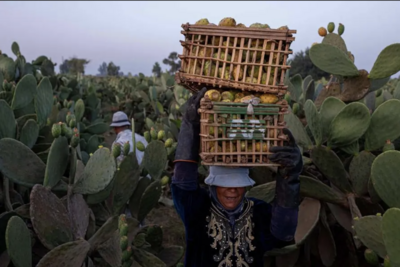 An Egyptian farmer carries boxes of freshly harvested prickly pear, a seasonal fruit also known as cactus fruit, at a farm in the village of Mit Kinahh in the al-Qalyubia governorate on July 4, 2024. (Photo by Khaled DESOUKI / AFP)Daily News Egypt | 2 September 2024
An Egyptian farmer carries boxes of freshly harvested prickly pear, a seasonal fruit also known as cactus fruit, at a farm in the village of Mit Kinahh in the al-Qalyubia governorate on July 4, 2024. (Photo by Khaled DESOUKI / AFP)Daily News Egypt | 2 September 2024Egyptian Countryside Development, Al Magd Group to cultivate 29,000 feddans of oil crops in west Minya
Egypt - Amr Abdel Wahab, chairperson and managing director of the Egyptian Countryside Development Company, signed an investment contract with Al Magd Group for a 29,000-feddan (12,180 ha) area. This project, located in South Safola, west Minya, will include an integrated agricultural-industrial complex focusing on large-scale cultivation of oil crops like sunflower and soybeans for edible oil and animal feed production.
During the contract signing ceremony, Abdel Wahab highlighted that this collaboration marks a significant step towards allocating land for the cultivation of strategic crops across different regions managed by the Egyptian Countryside Development Company. This aligns with the company’s commitment to attracting local and foreign investments and providing necessary facilities to foster sustainable development.
Abdel Wahab emphasized the company’s dedication to diversifying the crops cultivated on the project’s lands. He reiterated the company’s support for private sector companies to complement the state’s efforts in cultivating and producing strategic crops, particularly oil crops.
He further confirmed that the New Egyptian Countryside administration aims to focus on serious agricultural manufacturing activities and encourage their expansion within the 1.5 Million Feddan project. This is intended to maximize the land’s added value and achieve sustainable development in all its forms.
Abdel Wahab pointed out that oil crops are crucial for the local market as they underpin many important food, medical, and animal feed industries, playing an active role in the national economy. He noted that Egypt has the necessary climatic factors, soil characteristics, and resources suitable for oil crop cultivation. However, the country has seen a decline in the areas cultivated with these crops.
The consumption of vegetable oils in Egypt has been increasing significantly, while local production has not kept pace, leading to a widening food gap. Consequently, Egypt has been forced to import nearly 90% of its vegetable oil needs over the past decade.
During the meeting, Abdel Wahab highlighted the state’s significant efforts to ensure food security amid global challenges. He added that recent global crises have underscored the importance of expanding targeted investments to achieve self-sufficiency and protect local industries under current national and international circumstances.











